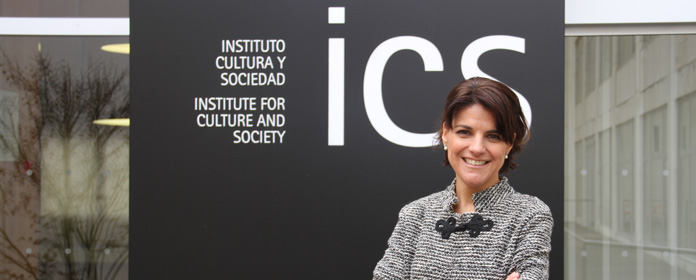"9 out of 10 Spanish teenagers have exercised some type of psychological violence over their boyfriend or girlfriend"
Cristina López del Burgo, an Institute for Culture and Society researcher, examines adolescent partner violence thanks to a grant from the Carlos III Health Institute

FOTO: Elena Beltrán
Controlling communication, location, social media posts are all common attitudes among young Spanish couples and teenagers. "According to various studies conducted in Spain, 9 out of 10 adolescents have exercised some type of psychological partner violence," according to Cristina López del Burgo, researcher within the Education of Affectivity and Human Sexuality project at the Institute for Culture and Society of the University of Navarra.
The expert warns that the situation is particularly worrisome: According to data from the 2017 Scope Project Barometer—carried out by the Queen Sofia Center on Adolescence and Youth— one in four young people between 15 and 29 years old believes that gender violence is "a normal behavior in a couple. " This same report notes that more than 20% of young people consider opinions about gender violence to be "exaggerated."
For its part, the Observatory against Domestic and Gender Violence published that trials for violence among adolescents increased by 48% from 2016 to 2017. In the last 15 years, this agency has seen five fatalities as a result of minor gender violence. And it is rising.
Is it possible to stop this trend? With their research, Lopez del Burgo’s team seeks to understand the profile of adolescents who exercise or suffer partner violence. To do this, they will select a representative sample of adolescents between 13 and 18 years old in Spanish schools. Through the schools, students will answer an online, anonymous questionnaire about partner violence, lifestyles, opinions and attitudes related to affectivity and sexuality, as well as about the messages they receive in their environment.
Detection and preventionThe questionnaire assesses partner violence, as well as other adolescent attitudes and lifestyles and the results will be useful for schools to develop education and health promotion programs adapted to their students’ needs. "For example," the expert illustrates, "if an association is detected between having a very dependent relationship and partner violence, programs that promote autonomy and personal decision-making could be developed."
Ultimately, for López del Burgo, detecting and making students aware of intimate partner violence "will bring attention to the problem and may even encourage those that are involved in some type of violence to seek help."
According to the expert, cases of violence may be more common in adolescence because "at this stage, feelings are very intense, adolescents idealize romantic love, lack experience and are subject to peer pressure." Although violent behavior can resolve itself with maturity, "it does suppose a risk factor for violence during adulthood," she added. Thus, prevention work in adolescence is vital.
This research will be undertaken thanks to a grant from the Carlos III Health Institute— which is part of the Ministry of Science, Innovation and Universities—and is part of the YourLife subproject within the Education of Affectivity and Human Sexuality project. This project, directed by researcher Jokin de Irala, aims to improve adolescent-level education concerning lifestyles, leisure, affection and sexuality. The YourLife project has already involved young people from the Philippines, El Salvador, Peru, Chile, Poland and Spain.
